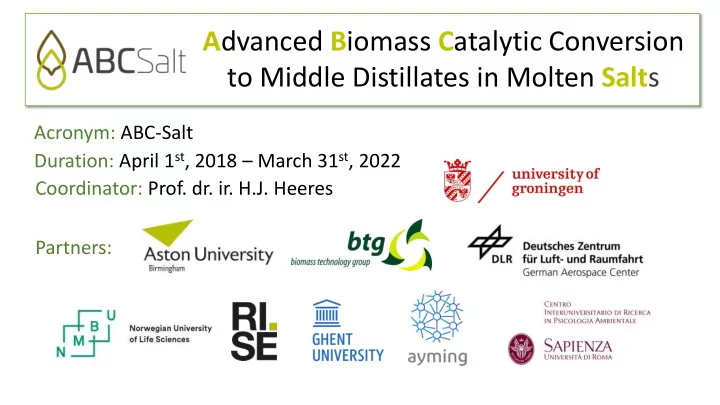

A dvanced B iomass C atalytic Conversion to Middle Distillates in Molten Salt s Acronym: ABC-Salt Duration: April 1 st , 2018 – March 31 st , 2022 Coordinator: Prof. dr. ir. H.J. Heeres Partners:
Project title : Advanced Biomass Catalytic Conversion to Middle Distillates in Molten Salts Project Acronym: ABC-Salt Project Number: 764089 Call: H2020-LCE-06-2017 Topic: Sustainable Fuels Main Category of the Project: Biofuels from lignocellulosic waste stream. TRL: 2. Keywords: Molten salts, Biomass liquefaction, Hydropyrolysis, Hydrodeoxygenation, Biofuels. Technological approach of the Project: Experimental research supported by system modeling on technology, environmental and social impact. The technology concept will be demonstrated in an integrated bench scale unit. Expected Impact of the Project: Accomplish TRL 4; create and pursue new, out-of-the-box innovative ideas, to improve the conversion efficiency for sustainable fuels. Contribution of the Project: Develop novel integrated technology for the efficient conversion of lignocellulosic waste streams to middle distillates using a unique concept. The concept will be investigated using a holistic approach, involving research activities towards a sound scientific understanding of the individual conversion steps as well as optimized process integration. Highlights (technological/non-technological): Biomass liquefaction in pumpable molten salts. This project has received funding from the European Union’s Horizon 2020 www.abc-salt.eu Research and Innovation Programme under grant agreement No. 764089
Overall Objective Development of a novel route at TRL level 4 to produce sustainable liquid biofuels (middle distillates) from various lignocellulosic waste streams for the transport industry targeting a yield over 35 wt% to hydrocarbons with 2/3 in the middle distillates range. Concept - Approach (Catalytic) (Catalytic) Biomass Hydro- Hydro- Liquefaction in Biomass deoxygenation Pyrolysis molten salts Step 1 : Dissolving biomass in novel media at ambient pressure and low temperature Step 2 : Vaporizing the biomass at elevated pressure and temperature Step 3 : Vapour-phase hydro-deoxygenation to produce middle distillates
Project Structure WP2: Techno-economic evaluation – socio-economic - environmental aspects Leader: DLR Participants: CIRPA, AU, RISE, BTG WP3: Primary liquefaction WP4: Hydro-pyrolysis WP5: Hydro-deoxygenation Leader: NMBU Leader: UG Leader: BTG Participants: Participants: Participants: AU, DLR, UG, RISE, RUG AU, RUG, NMBU RUG, UG W6: Demonstration of integrated concept Leader: RUG Participants: BTG, DLR, AU, RISE WP7: Dissemination, outreach activities and exploitation Leader: AU Participants: All WP8: Project Management Leader: RUG Participant: Ayming WP1: Ethics Leader: RUG - Participants: All
Summer School 2019 This year the ABC-Salt consortium is organising its first Summer School: “ Advanced thermochemical biomass conversion technologies ” Birmingham (United Kingdom) - Aston University (Aston Conference) 12-14 th August 2019 40 participants (young researchers and professionals) Main topics and activities will include : Introduction to thermochemical conversion technologies Overview to upgrading technologies of pyrolysis liquids Introduction on the use of molten salts in different thermochemical conversion technologies Applications, properties and standardisation of middle distillates Networking opportunities (mini-conference and poster presentations by Summer School attendees) Dedicated course - “Set up a project” (MSCA, ERASMUS or ERC) on how to successfully exploit Horizon 2020 Research and Innovation Programme with winning proposals
Recommend
More recommend